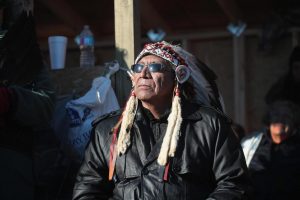
A federal judge has put the future operations of the controversial Dakota Access Pipeline (DAPL) in question.
In a ruling considered a victory by water protectors on Wednesday, a federal judge ordered the Army Corps of Engineers to “reconsider” its analysis of risks the crude oil pipeline poses to the public and the environment.
“We applaud the courts for protecting our laws and regulations from undue political influence and will ask the court to shut down pipeline operations immediately,” said Standing Rock Sioux Chairman Dave Archambault II.

BYPASS THE CENSORS
Sign up to get unfiltered news delivered straight to your inbox.
You can unsubscribe any time. By subscribing you agree to our Terms of Use
Latest Video
 By Jake Johnson: Water protectors celebrated a “very significant victory” on Wednesday as a federal judge deemed safety evaluations of the Dakota Access Pipeline insufficient and ordered the Army Corps of Engineers to “reconsider” its analysis of the risks the crude oil pipeline poses to the environment and the public.
By Jake Johnson: Water protectors celebrated a “very significant victory” on Wednesday as a federal judge deemed safety evaluations of the Dakota Access Pipeline insufficient and ordered the Army Corps of Engineers to “reconsider” its analysis of the risks the crude oil pipeline poses to the environment and the public.
In a 91-page ruling (pdf), U.S. District Judge James Boasberg declared that the Corps “did not adequately consider the impacts of an oil spill on fishing rights, hunting rights, or environmental justice, or the degree to which the pipeline’s effects are likely to be highly controversial.”
While acknowleging the ruling—which resulted from a lawsuit filed by the Standing Rock Sioux Tribe—as a partial victory because the judge did not order the oil flow stopped, Native American tribes and activists across the country deemed it a substantial win nonetheless.
BREAKING: Court finds that Trump admin approval of Dakota Access Pipeline violated the law https://t.co/h5HrTdSsL1 #NoDAPL pic.twitter.com/dFHjescBMB
— Earthjustice (@Earthjustice) June 14, 2017
JUST IN! Court rules that Dakota Access Pipeline needs further environmental review. @IENearth https://t.co/lbSy0Yagmx #NoDAPL
— 350 dot org (@350) June 14, 2017
Federal court: Dakota Access & Army Corps violated the law. Status conference next week to determine remedies. SHUT IT OFF. #NoDAPL
— tara houska (@zhaabowekwe) June 15, 2017
Huge news! We may kill that black snake after all!!! #nodapl #StandingRock https://t.co/Kx4FuGYnla
— Josh Fox (@joshfoxfilm) June 15, 2017
“The previous administration painstakingly considered the impacts of this pipeline, and President Trump hastily dismissed these careful environmental considerations in favor of political and personal interests,” said Standing Rock Sioux Chairman Dave Archambault II in a statement. “We applaud the courts for protecting our laws and regulations from undue political influence and will ask the court to shut down pipeline operations immediately.”
Jan Hasselman, an attorney for Earthjustice, said the ruling should not be downplayed as merely exposing “minor, paperwork transgressions.”
“This decision marks an important turning point,” Hasselman said. “Until now, the rights of the Standing Rock Sioux Tribe have been disregarded by the builders of the Dakota Access Pipeline and the Trump administration—prompting a well-deserved global outcry. The federal courts have stepped in where our political systems have failed to protect the rights of Native communities.”
Shortly after entering office, President Donald Trump made clear he would do everything he could to ensure the $3.8 billion project moves forward. As environmental groups feared, the pipeline almost immediately began to spring leaks.
The judge’s ruling on Wednesday represents the “first legal victory” for those looking to cease the oil flow before more damage is done.
“We’ve been saying the Environmental Analysis was not in line with the law, and that based on treaty rights, this project should never have been built,” Joye Braun, Cheyenne River Lakota community organizer with the Indigenous Environmental Network, said in a statement. “While we wish the flow of oil would be stopped until the hearings are completed, we trust that through prayer and continued vigilance we will stop the flow of oil and make Energy Transfer Partners and this administration keep fossil fuels in the ground.”



